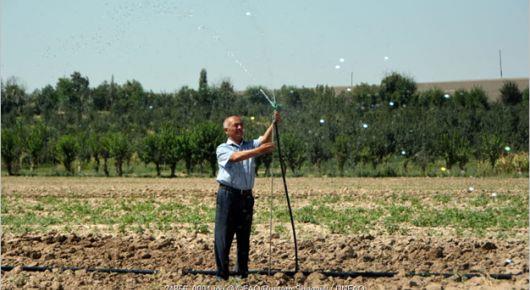Stronger agricultural extensions can boost crop production in Central Asia

A one-week training workshop on organic production, certification and marketing starts today in Bishkek, Kyrgyzstan, for selected extension specialists. It is part of an FAO project begun in April 2018 that helps public and private extension service providers in Azerbaijan, Kyrgyzstan, Tajikistan and Uzbekistan improve technical skills and enhance knowledge on modern crop management.
A similar workshop has already taken place in Tashkent, Uzbekistan.
The project’s main activities are trainings for national extension staff, such as the one starting today, and assistance in formulating national strategies for more effective agricultural extensions.
For historical reasons, the systems of agricultural extension services are not well-established in most of these countries. After the collapse of the Soviet Union, a number of reforms were rolled out in Central Asia, resulting in the privatization and transformation of farms. A big number of smaller, private farms have replaced the larger-scale kolkhozes and sovkhozes, or collective and state-owned farms.
These private farms are run by former farm members who, for the most part, don’t have agriculture backgrounds. Furthermore, the extension system that is supposed to aide them either does not exist or is very weak; during the Soviet period, it was the job of agriculture research institutes to provide extension services, but that is no longer the case.
“The system no longer functions in most Central Asian countries, and projects or non-governmental organizations supported by development organizations try to fill the niche and provide extension services,” explains FAO agricultural officer Hafiz Muminjanov. “However, the technical knowledge and experience of these specialists requires improvement for better provision of services to the farmers so that they can increase yield and crop production.”
Many of the specialists working in extension services are former school teachers or technicians who have no agriculture background or experience providing advice to adults.
Running until March 2020, the FAO project aims to foster a sustainable increase in crop yield and productivity that would lead to improved food security and increased income for smallholder farm families. In this regard, the project aims to improve national extension services, enabling them to provide timely and effective support to farmers and rural communities so that they can be resilient to climate change and adopt and promote improved crop, land and water management and pest control practices.
The project complements and builds on previous, ongoing and planned FAO projects and activities in the region regarding conservation agriculture, crop diversification, integrated pest management, seed security for small farmers, organic agriculture and value chains, empowerment of women in agriculture, and many more.
19 November 2018, Bishkek, Kyrgyzstan
